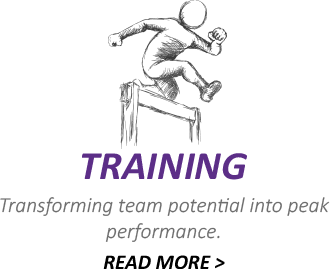
In addition to all the strategies and tactics of sales management we often discuss in this blog, there’s another aspect to your success which is much closer to home.
Your ability to communicate and positively influence your team.
What’s really interesting is that your success in this area is based almost entirely on just two key factors:
- Your Character:
The personal qualities you need to develop to lead with authenticity.
And
- Your Skills:
The current and relevant skills required to perform at the top of your game.
You really need this holistic approach to provide you with both the personal and professional development required for long-term, sustainable success.
It’s probably true that everyone would like to be a better leader and be able to positively influence others.
I’m going to use leadership and influence synonymously here because, when you really get down to its core, leadership is really the ability to communicate and influence people so that they listen and are moved to act, to change their thoughts or behaviour.
So, if this is not happening, then really you are not influencing them or leading them.
Now you might not necessarily think of yourself as a leader. Often people are promoted to positions of responsibility based on their previous personal success, rather than their ability to lead others. A situation that is all too frequent in sales, is when top performers are seen as the next potential top managers. Unfortunately, the two roles are very different and require completely different skill sets!
The reality is that in every area of life we are called to lead. Whether that is in sales, as a parent, a school football coach or as a company MD. We are all leading and influencing others. So, it makes sense to invest the time to understand how you can become exemplary in this area.
The world is crying out for men and women who can get things done; in every company, there is a constant need for true leaders. But what allows these individuals to have so much impact?
Here is a small exercise which I’d like to invite you to do:
List below two or three people you consider to be great leaders? (They can be from history or alive today.) ___________________________________________________ ___________________________________________________ ___________________________________________________ ___________________________________________________
Next, list what you think are the top ten characteristics of great leaders.
—————————————————————————————————-
Now, as you look back at your list, ask yourself on each one.
Is this a character trait? Or is it a skill?
Does it have to do with who they are as a person? Or is it a skill they have.
I’ve done this exercise many times with groups and individuals over the years and the result rarely changes. Nearly 100% of the time it’s the character traits people choose rather than skills when they are describing great leaders.
That’s because there is a core principle at play here;
People decide, either consciously or subconsciously, whether they will allow you to influence them based on two fundamental factors: Your Character and your Skills.
This means they will judge you based on who you are as a person plus how they perceive your skill level – what you do and how well you do it.
Based on these two factors they decide almost exclusively whether to follow you or not.
Can I ask you when was the last time your company sent you to a 4-hour character development program?
Never, right? We tend to focus on developing skills and we need to; it is an important factor. However, when it comes to leading others, people are deciding first. Are we good people?
Did you notice that they allow you to lead or influence them? This ability to lead is a gift that they give you. It’s their personal choice and they can take it away too at any time.
So, based on these principles, the only way to enhance your depth of influence is to improve your character and the skills you demonstrate day to day.
Now, you might not think of yourself as a leader and you may not be a good one, or at least not yet at your full potential. But with this understanding, you can now look to purposely develop the traits and skills of a great leader!
There are many fine personality traits that universally we value in others but especially in our leaders.
Here are just three that have a positive influence on others. Developing yourself in these areas will enable you to become a better leader, influence more people, and make more sales, all from the right foundation.
You can own each of these; they are under your control. That is an important distinction to make, as there are some things you can’t own or directly influence. Success comes when we learn how to own what is ours, do the best we can with it, and leave the rest alone.
- Sincerity This quality is foundational to the ability to lead people. In essence, it is the genuineness of your motives, actions, and behaviour. It involves living your life in a way that is whole and undivided. The minute people see you are divided or have two codes of conduct, either in your personal or professional life, you break the trust and belief in you. Are you are governed by your values and principles regardless of what may seem to be expedient or convenient circumstances of the moment?
- Commitment.Anyone that you seek to lead is bound to ask one question. How committed is the person asking me to be committed? You can’t expect commitment from others if it’s not clearly evident in you.Is your commitment demonstrated in these three areas of your life….
- Your Performance. Let me ask you when was the last time you met an athlete or a top business person that wasn’t fully committed to it?It just doesn’t happen, does it?Does your performance reflect your commitment to achieving top results?
- Your life’s ambitions and victories. Looking longer-term do you demonstrate a commitment to achieving your goals.
- Your commitment affects your quality of life.
When was the last time you found somebody who was totally uncommitted with a very high quality of life? It just doesn’t happen.
So, are you committed to continually learning, growing and improving the quality of your life?
“The quality of a person’s life is in direct proportion to their commitment to excellence, regardless of their chosen field of endeavour.” Vince Lombardi.
- Attitude. How do others perceive your attitude? Is it positive or negative? Would your team describe you as an optimistic person?The root of the word “optimistic” is the word opt or to choose. You choose your Attitude.
Who wants to follow a pessimist? Optimists lead people because people want to improve.
Fundamentally, you choose how you will see things.
This is done in a very specific way. Firstly, you need to understand the relationship between your thoughts, feelings, actions, and results.
You must be very aware of the thoughts you allow into your mind and control any negativity.
Your thoughts are powerful things and they directly control your emotions and feelings. These emotions will drive your beliefs, behaviour and actions, which ultimately create your results.
It takes real self-control to control your mind and its dominating thoughts but this is the only way to maintain a positive attitude, one that is not affected by circumstance.
“There is little difference in people, but that little difference makes a big difference. That little difference is attitude. The big difference is whether it is positive or negative.”
— W. Clement Stone.
In this brief post, we’ve touched on three character traits of top leaders. If you’d like to dive deeper and research more about all ten qualities of top sales leaders see Chapter 11 of The Sales Strategist. It would be great to hear your thoughts and comments on what you consider the most important qualities in your leaders?





